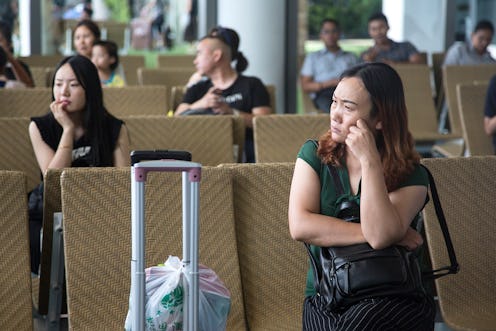News
A TSA Surveillance Program Could Be Collecting This Info About You

Have you ever changed direction while walking in an airport? Ever used your phone, touched your face, or engaged in conversation with others while waiting at the gate? Have you changed your hairstyle or gained or lost weight since the last time you flew? If you have, a new report from the Boston Globe shows the Transportation Security Administration (TSA) might already know exactly what you've done thanks to a previously undisclosed program. A TSA surveillance program known as Quiet Skies reportedly has federal air marshals following U.S. citizens who are not suspected of a crime or known to be on a terrorist watch list in order to collect information about their behavior, appearance, and movements, the paper has reported.
UPDATE: TSA spokesman James Gregory refuted reports that the agency was surveilling people through its Quiet Skies program, telling Bustle that "TSA is not surveilling people" and that "the program absolutely isn’t intended to surveil ordinary Americans."
Rather, Gregory likened the program to how a police officer would watch for suspicious behavior while walking their beat and stressed that the program does not take into account a traveler's race or religion. Gregory also refuted the Boston Globe’s claims that the Quiet Skies program was new and a secret, telling Bustle the program has been in existence since 2010 and has “robust congressional oversight.”
EARLIER: According to a new report from Boston Globe Spotlight fellow Jana Winter, an internal TSA bulletin recently obtained by the paper but dated from sometime in March appears to give those involved in the Quiet Skies program broad discretion over which U.S. citizens they choose to collect information about. The bulletin notes that the program targets travelers "not under investigation by any agency and [who] are not in the Terrorist Screening Data Base." And while there are reportedly 15 rules for screening, they include things like the person is "possibly affiliated" with someone known to be on a watch list or the person has behavior or travel patterns that match the behavior of a suspected terrorist.
Documents shown to the Boston Globe reportedly noted that, on average, air marshals follow and surveil roughly 35 of the 40-50 domestic air travelers selected for screening under the Quiet Skies program every day. And those selected to be surveilled under the program aren't notified that they're under observation. But federal air marshals aren't tasked with simply observing the air travelers selected under the Quiet Skies program, they collect information about them, too.
The checklist of behavior federal air marshals reportedly watch for while surveilling a traveler is extensive. It includes questions about whether or not the subject changed directions or stopped while walking through an airport; did they shave or change clothes in a bathroom; did they look at a boarding gate from afar; did they meet anyone in the airport; did they board the plane last; did they sleep a lot or a little on the plane; did they sweat, stare, fidget or touch their face; did they check a bag or have a carryon item; did they use their phone; did they go to the bathroom; did they engage in conversation with anyone? Air marshals also reportedly observe how the traveler departs from the airport after arriving at their destination: were they picked up in a private car, did they take a taxi, bus, or shuttle or did they opt to rent their own vehicle?
Air marshals are also asked to report if the person's appearance is different or changed in any way from the photo and description provided in their file. Changes in weight, facial hair, hair color or style are allegedly noted, along with any visible tattoos or piercings.
But some air marshals involved in the program have said it targets air travelers who don't appear to pose any threat at all. In comments to the Boston Globe, they criticized the Quiet Skies program as costly and a detraction from "more vital law enforcement work."
"The Air Marshal Association believes that missions based on recognized intelligence, or in support of ongoing federal investigations, is the proper criteria for flight scheduling," President of the Air Marshal Association John Casaretti told the Boston Globe in a statement. "Currently the Quiet Skies program does not meet the criteria we find acceptable. The American public would be better served if these [air marshals] were instead assigned to airport screening and check in areas so that active shooter events can be swiftly ended, and violations of federal crimes can be properly and consistently addressed."
In a written statement to the paper about how the agency operates, a TSA spokesperson said that federal air marshals "may deploy on flights in furtherance of the TSA mission to ensure the safety and security of passengers, crewmembers, and aircraft throughout the aviation sector."